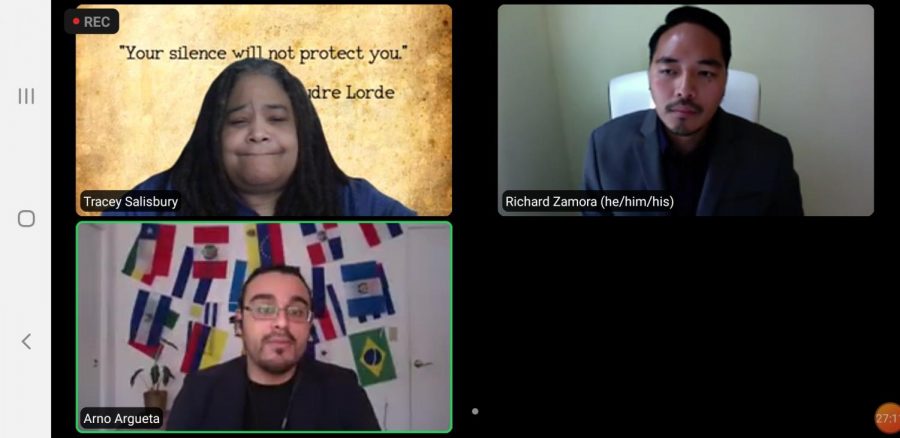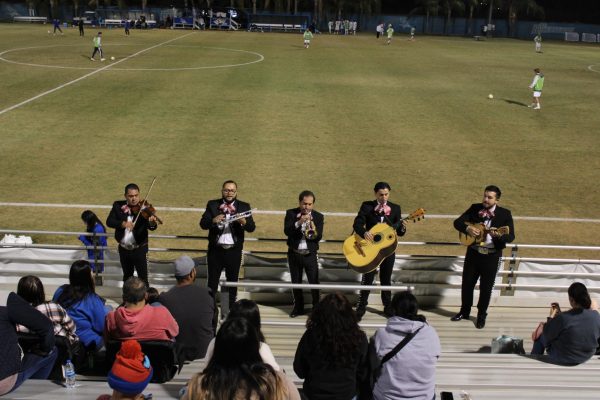Discussion on intersectionality highlights there is still work to be done
Tracey Salisbury, Arno Argueta, and Richard Zamora discussing intersectionality and diversity.
September 23, 2020
Concepts of identity can be challenging ideas to wrestle with. Terms such as child, parent, student and lover appear isolated, yet can simultaneously define a single person. CSU Bakersfield’s Division of Equity, Inclusion, and Compliance within the Office of the President in partnership with the Associated Student’s Inc. hosted a panel discussion titled “The Importance of Intersectionality: Black Lives Matter, Latinx, Filipinos, LGBTQ+” on Sept. 17 as part of their Community Conversations series.
The three member panel consisted of CSUB professors, Arno Argueta, assistant professor of modern languages & literatures, Tracey Salisbury, assistant professor of interdisciplinary studies, and Richard Zamora, assistant professor of psychology.
Coined by UCLA and Columbia Law School professor Kimberlé Crenshaw, intersectionality grapples with identity as a whole—not singular concepts—and the manner in which those singular concepts are used to marginalize and oppress.
The broad discussion covered how intersectionality interacts with areas ranging from racial, ethnic, and gender identity to media representation and mental health, along with the fields of education and academia. The conversation began with the panelists defining intersectionality.
Argueta said, “Intersectionality [is] a critical perspective [that proposes] a person is not defined by a single identity, but how all their identities crisscross and add to a person’s perspective in their world.” Zamora said intersectionality “is a place to understand and a lens to look at those who have been invisible in our community.”
Intersectionality is being overused, according to Salisbury. Salisbury agreed with Zamora and Argueta’s definition, but noted that initially Crenshaw was talking about the unseen in a legal and representative manner.
The discussion addressed the issue of simply talking about intersectionality and doing its work, along with the roles various members of the community have.
“The problem with intersectionality and understanding intersectionality is understanding that it’s just identifying a problem and not addressing power, the inequity of power,” Salisbury said.
Argueta noted part of that work is building bridges and working towards unity. Zamora added that part of the work is being aware of one’s own possible privilege.
A recurring theme throughout the discussion was that idea that no one is an island. People, groups and concepts of identity are not monolithic notions. Finding common ground and working together is intersectionality in action.
Salisbury commented that marginalized groups need to be allowed to define themselves and that “we need to be allies and supportive in [their] discussion and not make it harder.”
The panel also discussed the role of education and academia. The panel acknowledged the freedom they have to share their views and the support of CSUB, ASI, and president Zelezny. However, they expressed their feelings on how the university can do more.
Argueta acknowledged the move by California Gov. Gavin Newsom to add an ethnic studies requirement to all degrees in the CSU system, commenting that universities should have initiated it.
“That’s part of the initiative that universities should have taken, that’s a necessary conversation. And not to water it down, not to say, ‘hey we only need to talk about how race impacts our field’. No, no, no. Let’s talk about race in itself. Let’s talk about gender in itself,” Argueta said.
The panelists agreed this is only the beginning of the conversation and that more discussion and more work is left to be done among students and faculty.
“You need to be an active and involved student in your community. You need to stop pretending it doesn’t affect you,” Salisbury said.







